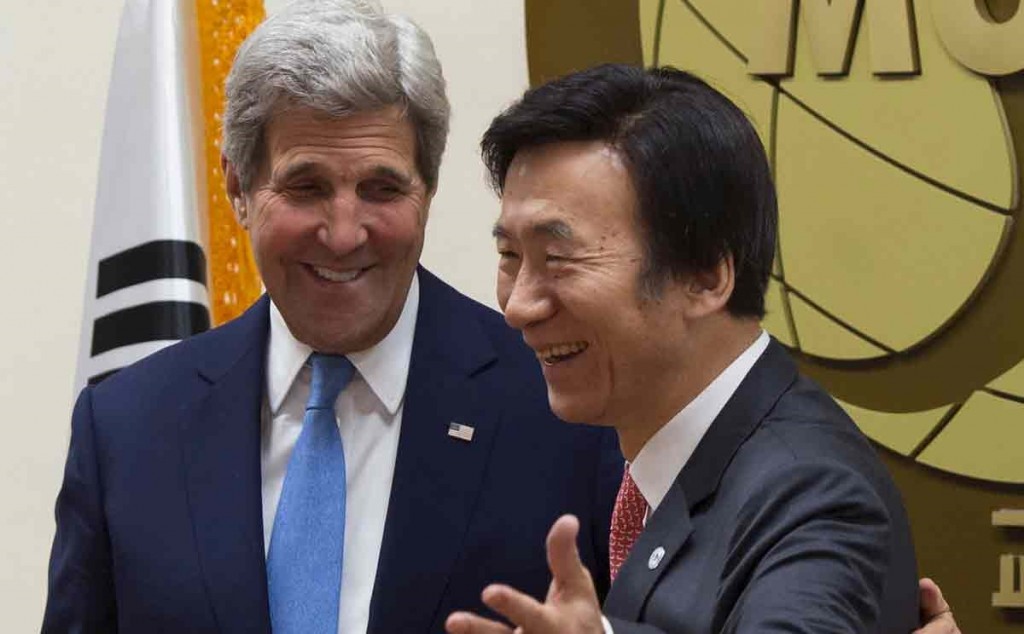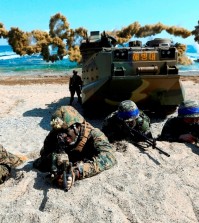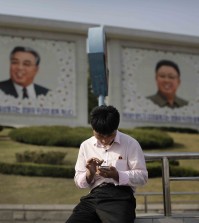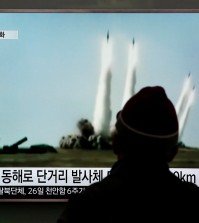- California Assembly OKs highest minimum wage in nation
- S. Korea unveils first graphic cigarette warnings
- US joins with South Korea, Japan in bid to deter North Korea
- LPGA golfer Chun In-gee finally back in action
- S. Korea won’t be top seed in final World Cup qualification round
- US men’s soccer misses 2nd straight Olympics
- US back on track in qualifying with 4-0 win over Guatemala
- High-intensity workout injuries spawn cottage industry
- CDC expands range of Zika mosquitoes into parts of Northeast
- Who knew? ‘The Walking Dead’ is helping families connect
S. Korea, US agree to put greater pressure on N. Korea

South Korean Foreign Minister Yun Byung-se, right, and U.S. Secretary of State John Kerry greet each other prior to a meeting at the Ministry of Foreign Affairs in Seoul, South Korea. Yun believes that increased pressure should be put on North Korea for denuclearization talks. (Saul Loeb/Pool Photo via AP)
WASHINGTON, June 16 (Yonhap) — South Korean Foreign Minister Yun Byung-se and U.S. Deputy Secretary of State Tony Blinken agreed Tuesday to put greater pressure on North Korea to help resume long-stalled negotiations on Pyongyang’s nuclear programs, officials said.
“While responding firmly to North Korea’s provocations and threats based on strong combined defense capabilities, the two sides agreed to strengthen five-party collaboration and put in efforts to resume meaningful dialogue, including even stronger pressure,” the foreign ministry said in a statement, referring to six-party nuclear talks with the North.
Yun arrived in Washington on Monday for the formal signing of a civil nuclear energy cooperation agreement between the two countries. After Monday’s signing, Yun held talks with U.S. National Security Adviser Susan Rice and met with Assistant Secretary of State Daniel Russel and other officials.
Tuesday’s meeting with Blinken came as the No. 2 American diplomat is filling in for Secretary of State John Kerry, who has been recovering from a leg injury sustained in a cycling accident on a trip to Europe for Iranian nuclear talks at the end of last month.
Yun’s trip came after President Park Geun-hye postponed a visit to Washington to focus on overseeing the government’s efforts to cope with the massive outbreak of Middle East Respiratory Syndrome (MERS).
During Yun’s talks with Blinken, the two sides agreed to work actively together to reschedule Park’s visit to a mutually convenient and earliest possible time, the ministry said.
Blinken was quoted as saying that Park’s visit would serve as an important chance to further develop the already strong Korea-U.S. alliance and move forward cooperation on the North Korean nuclear issue and other regional and global matters, the ministry said.
Yun also briefed Blinken on various efforts that Seoul has been making to improve frayed relations with Japan on the 50th anniversary of normalization of relations between Seoul and Tokyo, and Blinken expressed support for Seoul’s efforts to promote regional peace, stability and prosperity, the ministry said.
Recalling trilateral vice minister-level talks that Blinken held in April with his South Korean and Japanese counterparts, Blinken also said that he looks forward to continuing such three-way cooperation, according to the statement.
Yun asked for U.S. support for the South Korean candidate running for secretary general of the International Maritime Organization (IMO), and Blinken said the U.S. will seriously consider Seoul’s request given the issue’s importance.
After talks with Blinken, Yun also held a brief meeting with Undersecretary of State Wendy Sherman, praising her for her efforts to resolve the Iranian nuclear issue and asking her to make greater efforts to move the Korea-U.S. alliance forward.
Sherman said she fully understands Park’s decision to postpone the U.S. visit and she believes the Asian ally will deal well with the situation. She also reaffirmed full U.S. cooperation and support for South Korea.
Earlier in the day, Yun held a breakfast meeting with leading U.S. experts on Korea, such as Jeffrey Bader, a former Asian affairs adviser to President Barack Obama; Michael Green, senior vice president for Asia at the Center for Strategic and International Studies (CSIS); Victor Cha, Korea chairman at CSIS, and Douglas Paal, vice president and director of the Asia Program at the Carnegie Endowment for International Peace.
















